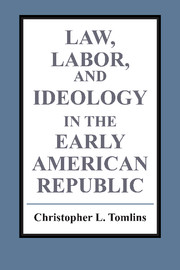Book contents
- Frontmatter
- Contents
- Preface and acknowledgments
- Prologue: two moments of the republic
- PART 1 LAW AND THE FACTS OF AMERICAN LIFE
- 1 Law: the modality of rule
- 2 Police: the pursuit of happiness
- 3 An excess of democracy
- PART 2 LAW, LABOR, AND STATE
- PART 3 LAW, AUTHORITY, AND THE EMPLOYMENT RELATIONSHIP
- An interlude: on law and economy
- PART 4 THE NEW INDUSTRIAL ORDER
- Epilogue: “free Ameriky”
- Index
1 - Law: the modality of rule
Published online by Cambridge University Press: 05 August 2012
- Frontmatter
- Contents
- Preface and acknowledgments
- Prologue: two moments of the republic
- PART 1 LAW AND THE FACTS OF AMERICAN LIFE
- 1 Law: the modality of rule
- 2 Police: the pursuit of happiness
- 3 An excess of democracy
- PART 2 LAW, LABOR, AND STATE
- PART 3 LAW, AUTHORITY, AND THE EMPLOYMENT RELATIONSHIP
- An interlude: on law and economy
- PART 4 THE NEW INDUSTRIAL ORDER
- Epilogue: “free Ameriky”
- Index
Summary
Men generally set up the most solid embankments against open tyranny, but do not see the imperceptible insect that gnaws at them and opens to the flooding stream a way that is more secure because more hidden.
Cesare Beccaria, Dei Delitti e delle Pene (trans. Henry Paolucci)In conceptualizing social institutions and the action they envelop, recent trends in contemporary social theory have tended to reinforce the historian's more intuitive proclivity to take nothing for granted. The relationship between human activity and its context, we are warned, is problematic and indeterminate. Society and its cognates – economic processes, cultural traditions, values, and mores – are ultimately contingent upon the epistemological speculations in which all human beings must engage in order to establish sufficient common ground to enable each other's actions to be observed, described, categorized, debated, and, ultimately, understood. Contemporary social theory does not deny that the relationship between human action and social context is amenable to explanation, but it does seek to restore the contingency attendant upon an appreciation of human agency to that task of explanation. Society must be understood as the expression neither of an all-pervading underlying natural order nor of irresistible material forces. Rather, society “is made and imagined … a human artifact.”
- Type
- Chapter
- Information
- Law, Labor, and Ideology in the Early American Republic , pp. 19 - 34Publisher: Cambridge University PressPrint publication year: 1993
- 2
- Cited by



